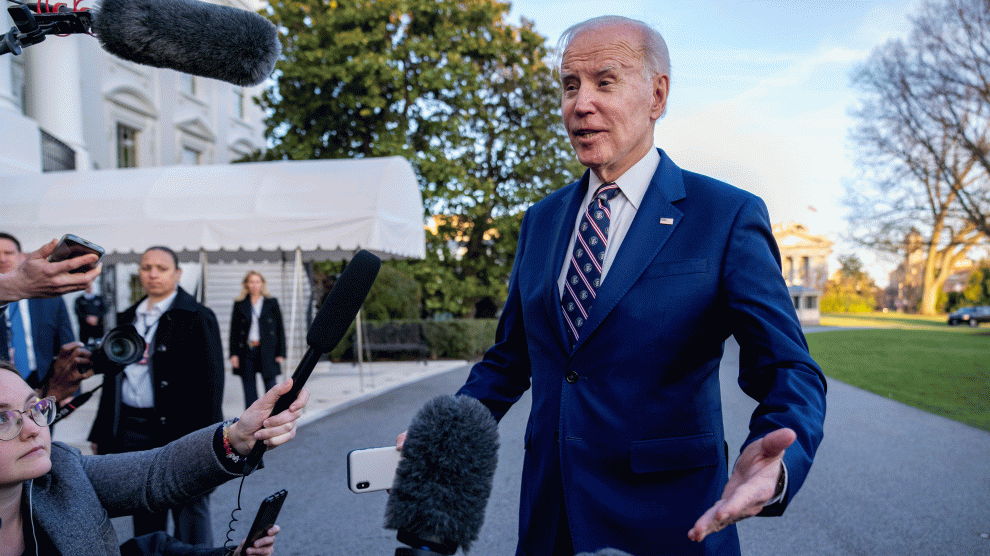
President Biden takes questions from reporters on Thursday, March 9, 2023.Andrew Harnik/AP
Joe Biden’s latest budget, not surprisingly, is pretty pie-in-the-sky. Presidential budgets are wish lists, after all, statements of priorities that throw down the gauntlet for the other side. In this case, Biden is daring congressional Republicans—who only seem to be concerned about deficits when a Democrat is in power—to oppose higher taxes on rich families and corporations, levies that would help fill the budget gap and pay for things like bolstering Medicare and restoring a pandemic child tax credit that succeeded in lifting families out of poverty.
And oppose those taxes they will. Most of Biden’s proposals, it is fair to say, won’t fly so long as Republicans control the House. Heck, even when the Dems held both chambers—if only by a hair—they were largely unable to raise taxes on the wealthy or kill silly loopholes like carried interest or the sneaky trusts used by America’s richest families to avoid inheritance taxes.
So, what are these proposals—and which ones, if any, stand a chance? Let’s see. In no particular order, Biden hopes to:
1. Raise the “net investment income tax” from 3.8 percent to 5 percent for people making more than $400,000 a year, and expand the income categories the tax applies to in order to thwart tax-avoidance.
Verdict: Unlikely. This tax on high earners, first levied to pay for the Affordable Care Act, was in part what inspired the Republican Party to defund the IRS during the 2010s. Biden might be able to do something on the avoidance front, but raising the NIIT rate will be all but impossible in this political environment.
2. Levy a 25 percent minimum income tax on households with assets of $100 million-plus. (The White House calls it the “billionaire minimum income tax.”)
Verdict: Dead on arrival (DOA). Billionaires and megamillionaires often structure their affairs to minimize taxable income. The only way this works is to tax unrealized capital gains—the paper profits on assets like stocks that haven’t yet been sold. Taxing unrealized gains was proposed earlier on Biden’s watch, but the Senate—specifically Joe Manchin—wouldn’t bite. And the Republican House won’t touch this.
3. Raise the corporate income tax rate to 28 percent from 21 percent (which is among the world’s lowest rates). That’s still significantly lower than the 35 percent rate when Donald Trump took office. And in practice, most big corporations have been paying way less than 21 percent—some none at all—though a provision in the Inflation Reduction Act should help to address that.
Verdict: DOA. Biden proposed a 28 percent rate for Build Back Better, and couldn’t even get it through a Democratic Congress.
4. Raise the top marginal income tax and capital gains tax rates to 39.6 percent.
Verdict: DOA. You may also recall these numbers from Build Back Better. The first proposal would simply restore the top income bracket to what it was in 2017. But if you care about wealth inequality, the second part—taxing income from the sale of assets at the same rate as income from working—would be a game-changer. This two-tiered income tax is among the most unfair and unjustifiable aspects of our system, but it’s unlikely to change anytime soon.
5. Raise the tax on foreign earnings of US multinationals from 10.5 percent to 21 percent.
Verdict: Unlikely. This proposal might have more populist appeal for Republicans than the items above, but the GOP seems poised to oppose even the 15 percent global minimum tax on foreign corporate earnings required by an international agreement meant to thwart major tax havens—the United States among them.
6. Quadruple the 1 percent tax on stock buybacks that took effect in January.
Verdict: DOA. The Dems passed the buyback tax as part of the Inflation Reduction Act, which some Republicans really want to repeal. But Biden is right to pursue this, given the disgraceful way public companies behaved after the GOP slashed their tax rate in 2017. As I wrote in my book, “rather than investing their tax windfall back into their operations, S&P 500 firms spent a record $806 billion in 2018 buying back their own shares on the public markets.” Such buybacks, a trio of economists pointed out in Harvard Business Review, primarily serve to enrich “investment bankers and hedge-fund managers as well as senior corporate executives at the expense of employees, as well as continuing shareholders.”
7. End “special tax treatment” for fossil-fuel companies.
Verdict: Unlikely. The White House hasn’t detailed what it’s proposing here, but dirty industries still have a lot of juice in Congress—and a loyal friend in Sen. Joe Manchin.
8. End carried interest.
Verdict: DOA. Even Donald Trump pledged to kill this abomination and failed. You may recall how Sen. Kyrsten Sinema personally put the kibosh on this no-brainer. Well, with Republicans ruling the House, it’s a non-starter.
9. End the “like-kind” exchange rule.
Verdict: Unlikely. Simply put, the like-kind rule allows investors—typically in real estate—to defer the capital gains taxes due when they sell assets (land, properties, etc) for a profit, as so long as they promptly roll the proceeds back into other, substantially similar assets. (Here’s an example.) It’s a lucrative perk, and the real-estate sector—which is second only to Wall Street in political giving—will fight tooth and nail to keep it.
10. Limit the amount of money that people who make more than $400,000 a year can hold in government-subsidized retirement accounts.
Verdict: Unlikely. I’ve written a lot about this. We have tens of thousands of Americans with north of $5 million socked away in their tax-advantaged Individual Retirement Accounts—$5 billion in the case of Peter Thiel—yet they still get tax breaks on further contributions. That’s nonsensical—especially as Republicans lawmakers champ at the bit to gut Social Security and Medicaid. But no need to peg it to income. You could simply cut people off once their combined retirement accounts add up to a few million bucks. During the Build Back Better negotiations, the Senate Finance Committee crafted language that would have capped a person’s total tax-advantaged savings at $10 million. But even that generous limit didn’t get into the final bill—which failed anyway.
11. Place a 30 percent tax on electricity used to mine cryptocurrency.
Verdict: Possible. Jim Tankersley of the New York Times spotted this one. Crypto-mining operations suck up vast amounts of power, and miners have even revived fossil-fuel plants to generate it. The administration is right to discourage this behavior, which is counter to the nation’s energy goals. But this proposal is chump change relative to the others, and I’m just not sure Republicans care enough to fight it.
Tax attorney Bob Lord, who once worked in private practice and now serves as senior advisor on tax policy for the Patriotic Millionaires, largely agreed with my verdicts. “If you step back,” he said, “it’s scandalous that we’re talking about closing these gaping, egregious loopholes and then talking about that being DOA in the legislature.” But we may as well save the final word for the late Roy Orbison, who crooned: It’s too bad that all these things…can only happen in my dreams.


















